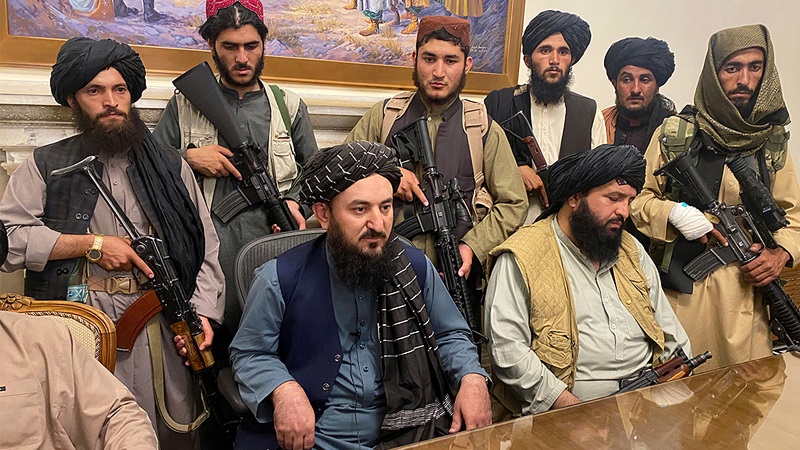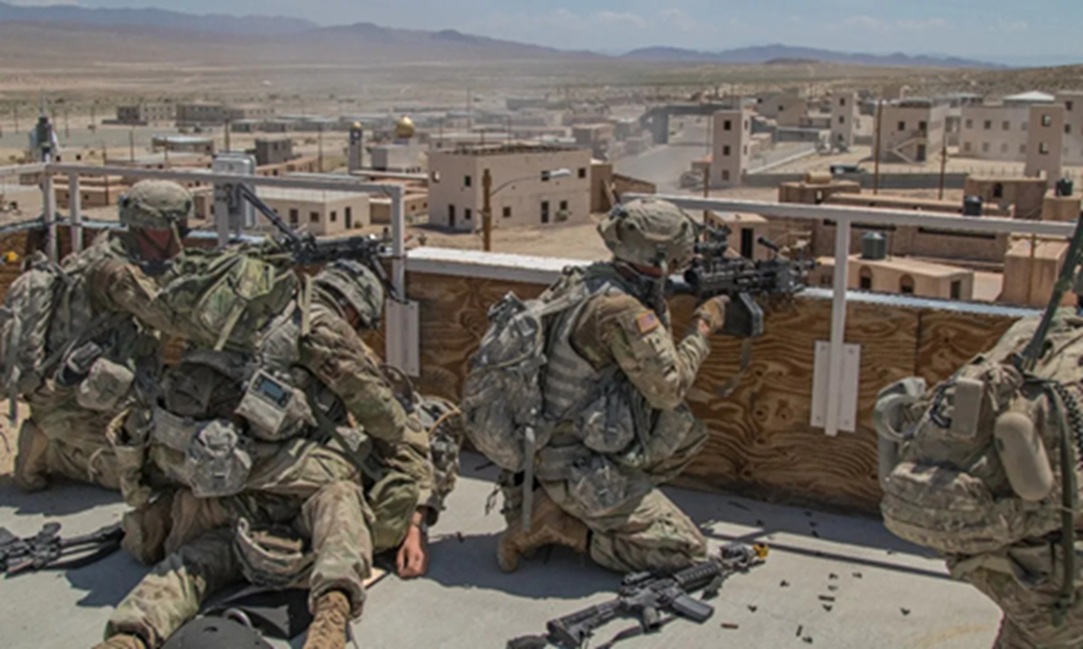Taliban is a Pashtu word for students. Taliban is a predominantly Pashtun, Islamic fundamentalist group that ruled Afghanistan from 1996 until 2001 until the U.S.-led invasion ousted the Taliban regime for providing refuge to al-Qaeda and Osama bin laden. Founded in 1992 in Southern Afghanistan by one-eyed Islamic cleric – Mullah Mohammad Omar, the Taliban managed to capture Kandahar and gained control over Kabul, in 1996 after hanging Mr Najibullah from a lamppost. At the time, no country in the world recognized the Taliban government in Kabul with the exception of Pakistan, Saudi Arabia, and the United Arab Emirates, and during 1996 and 2001, the Taliban thrived on Afghan soil.
Osama bin laden the founder of al-Qaeda took refuge in Afghanistan to plan and execute the infamous attack on the Twin towers and Pentagon. Taliban and al-Qaeda had very close ties when the Taliban was ruling in Afghanistan. Al Qaeda was supported by the Taliban regime and their logistics came from Pakistan. In the words of Major General Ak Siwach (Maj Gen Siwach, 2021) said that Taliban and al-Qaeda were very close to each other, they were two sides of the same coin.
Current Situation in Afghanistan
Violence in Afghanistan has been on the rise against the backdrop of the rapid withdrawal of US troops. The US has completed its troop’s withdrawal, almost ahead of the 20th anniversary of the 9/11 attacks. The Taliban remains a potent force in Afghanistan and is considered crucial in the peace process.
Afghanistan’s envoy to India Farid Mamudzay had listed out their expectations from India. He had said that India could assist Kabul with military hardware, intelligence & logistics support. India could also assist Afghanistan in financial resources in fighting regional & foreign terrorists. The Ambassador (Laskar, 2021) said:
“If we get to a stage where war is imposed on the Afghan public, then we look at India for military and security assistance to protect our people and fight terrorist groups. So, we have not yet got to the stage, we’re still giving peace a chance”.
How India has helped Afghanistan?
After the US invasion of Afghanistan in 2001, New Delhi got a chance to create an influence inside Afghanistan by making soft power investments without intervening in political matters. India made substantial investments in developing Afghanistan’s infrastructure such as schools, hospitals, dams, roads, etc. Salma Dam in Herat testifies to India’s commitment to economic development and likewise, thirty-six projects India has done for Afghanistan. Some of the major projects are (1) parliament building in Kabul; (2) rebuilding of the Habibia high school ;(3) Afghan public institutions with technical advisers; (4) tele-education courses; (5) Zaranj-delaram road and other projects, including dozens of schools and basic health clinics.
India also played a primary role in training Afghan military personnel. Reports say nearly 300 cadets are currently training in India (Negi, 2021). India also plays an important role in the medical treatment of injured Afghan military personnel. Over the year India has supplied seven helicopters to Afghanistan. In the year 2015-16 India supplied four Mi-25 attack helicopters and three cheetah light helicopters. In 2019 India replaced the Mi-25 with four Mi-24v (Roche, 2019) attack helicopters. Earlier Afghanistan had sought offensive military hardware including artillery guns, tanks, and armoured vehicles.
India’s external affairs ministry recently made it clear that New Delhi has no role once projects are completed. India withdrew its ambassador and diplomatic staff from Kabul on August 17 in view of a worsening security situation. However, the Taliban has assured the security of foreign missions and their personnel.
Are US, Russia Favouring Pakistan?
The US military and NATO are in the final stages of withdrawal from Afghanistan. Reports say countries like the US & Russia will favour Pakistan due to its geostrategic location (Umair, 2021). Russia has signed an agreement to build a 1,100-kilometre-long gas pipeline from Karachi to Lahore. (AFP, 2021)
India is concerned about the presence of Pakistan-backed Lashkar-e-Taiba and Jaish-e-Mohammad terrorists in Afghanistan. Afghanistan’s ties with Pakistan have suffered after the kidnap of the ambassador’s daughter in Islamabad last month. However, the appointment of Sarajuddin Haqqani as the country’s interior minister shows Islamabad’s influence and political clout inside Afghanistan. Nevertheless, some segments within Afghanistan including the Taliban have openly criticized Pakistan’s interference.
Assessment of Crisis
India is assessing the security situation in Afghanistan. Taliban expansionism is a growing concern across the region. US troops’ withdrawal has resulted in the Taliban’s aggressive posturing that has the potential to affect India’s security concerns.
India believes the Taliban’s claim of capturing 85% of Afghan territory is highly exaggerated and it actually controls only 40-50 % of territory mostly in rural parts of Afghanistan (CRUX, 2021) is under the Taliban’s control. Taliban strategically captured key border points like Spin Buldak in a bid to send out a message that Afghanistan is under their control.
India believes that the hurried US pull-out resulted in gaps in Afghan’s air force & intelligence surveillance. International military support is key to counter the Taliban’s expansionist attempts. The next 2-3 months are crucial in deciding Afghanistan’s future.
India has evidence that Pakistan is providing logistical support to the Taliban. Taliban fighters injured in a confrontation with Afghan forces have been treated in Pakistan’s Quetta (Laura, 2021). There has been a bike rally was conducted in support of the Taliban in August there is local support for the insurgent group and over time, they may become stronger. There has also been an announcement made in Khyber Pakhtunkhwa province to join the war against the Afghan government (CRUX, 2021). Thousands of Taliban fighters seeking refuge in Pakistan’s Afghan president. Pakistan air force has warned Afghan forces on acting against Taliban – Afghan vice president Amrullah Saleh (Laura, 2021)
Soaring security concerns across the neighbourhood
Not just India, China is also concerned about the security in Afghanistan. Afghan situation could fan separatist sentiments among Uyghurs in China. Tajikistan and Uzbekistan are concerned about the humanitarian situation in Afghanistan. India knows that the Taliban provides supports to Pakistan-based terror outfits Lashkar-e- Taiba & Jaish-e-Mohammed. Owing to Afghanistan’s strategic importance and geographical proximity to India, New Delhi is closely watching the developments in Kabul. However, with the Taliban sitting in Kabul, New Delhi would have limited say and political influence.
Are Indian officials really involved with the Taliban?
According to reports; there have been intermittent contacts between Indian officials and the Taliban at different levels in the past few years. Engagement from the Indian side is reportedly being driven by national security advisor, Ajit Doval (TNN, 2021)
India’s External Affairs Minister (EAM) S Jaishankar also weighed in on the issue at a recent UNSC debate on Afghanistan. According to him, the report suggests that the intra-Afghan talks have not resulted in a reduction of violence and it has only increased especially after May as the country has been witnessing targeted attacks. The External Affairs Minister said:
Any political settlement ‘in Afghanistan must ‘preserve a constitutional democratic framework. India has been supportive of all the efforts being made to accelerate the dialogue between the Afghan government and the Taliban, including the intra-Afghan negotiation. If the peace process is to be successful then it’s necessary to ensure that the negotiating parties continue to engage in good faith, eschew the path to find a military solution, and fully commit towards reaching a political solution, a tangible demonstration of this commitment is required. (MEA, 2021)
Earlier in June 2021, External Affairs Minister S Jaishankar reportedly made at least two transit halts in Doha, Qatar. During the first half on June 9, Jaishankar met Qatari National Security Advisor, Mohamed Bin Ahmed Al Meshed. During another transit halt on June 15, the EAM met Qatari foreign minister, Mohammed Bin Abdulrahman Al-Thani. The EAM also held talks with US special envoy Zalmay Khalizad and exchanged perspectives on issues in Afghanistan. However, the Indian govt has not officially confirmed the development with the Taliban in Doha (MEA, 2021).
What do the Taliban want from India?
Taliban reached out to India for the first time since taking control of Afghanistan. After assuming power in Kabul, a Taliban leader made their first official statement on India. The remarks were made during an interview with the Pakistan HUM news channel on August 16. The insurgent group said that it would allow India to complete its reconstruction and infrastructure projects in Afghanistan. During the interview, the Taliban spokesperson added that the Indian presence in Afghanistan wouldn’t be used against Pakistan. (CRUX, 2021) However, India’s role in Taliban-led Afghanistan would be limited and New Delhi may not be able to have the same influence as before. At best, it may try to negotiate with the Taliban for security but it won’t be pre-mature to expect much strategic gains and influence.
Kashmir factor
As per a report, the Taliban has clarified its stand on Kashmir and said it regards it as a bilateral and internal issue. The source that spoke to the news agency said the Taliban is unlikely to focus on Kashmir (News desk, 2021). This came after an increase in security watch in Kashmir following the group taking power in Afghanistan in August.
The situation had triggered a security threat as groups like Lashkar-e-Taiba and Lashkar-e-jhangvi are present in Afghanistan. Both the terror outfits are known for their anti-India operations in the Kashmir valley. The scenario New Delhi fears most is the Taliban’s victory emboldening terrorist organizations in neighbouring Pakistan, endangering India-controlled Kashmir. The Indian foreign minister has raised this concern repeatedly in talks with neighbouring countries such as Qatar since the U.S. began withdrawing troops in April.
Conclusion
Geographically, Afghanistan has always been considered India’s gateway to Central Asia. It has always been crucial for India’s strategic interests in South Asia also. After Afghanistan was left destroyed in 2001, India helped the country to build roads, schools, hospitals, dams, and many other crucial projects to help shape the country’s future. With around US$3 billion in assistance from India, Afghanistan is one of the largest beneficiaries in South Asia. India has assured support to the Afghan government to maintain stability in the country, for a stable Afghanistan is not only important for India but for the whole region. With the Taliban’s return to power after 20 years of war, the nature of India’s engagement with Afghanistan has come into sharp focus. Groups such as the Lashkar-e-Taiba and Jaish-e-Mohammad have been keeping centres and training grounds along with the southern provinces of Afghanistan that border Pakistan. With the Taliban in power, they appear to have more unrestricted opportunities to carry out attacks against India. Taliban’s control will also mean a bigger hand for the Pakistani military and intelligence agencies to influence outcomes for Afghanistan. The threat for more and more radicalization and its resultant impact on India’s internal security emerges as a major concern. This was seen in South Asia in the aftermath of the last withdrawal by foreign troops in Afghanistan in the 1990s.
There is also a potential fallout on trade and the economy. The impact of radicalization and pro-Pakistan disposition by the Taliban, in addition to other terrorist groups mentioned, will have an adverse impact on ongoing Indian projects in Afghanistan. It is likely that trade through Afghanistan under a Taliban regime would be routed through Karachi and Gwadar rather than Chabahar. Even as India accelerates backchannel talks with the Taliban, India is also unlikely to officially acknowledge the Taliban government in the near future. However, keeping the strategic implications for India’s internal security and its economic interests through Chabahar, it needs to evolve and follow a pragmatic solution towards Taliban-ruled Afghanistan.
Title image courtesy: https://eeradicalization.com/is-there-a-new-taliban-in-afghanistan/
Disclaimer: The views and opinions expressed by the author do not necessarily reflect the views of the Government of India and Defence Research and Studies
References
- Laskar, R. H. (2021, july 10). India can help boost our air power; Afghan envoy. Retrieved august 16, 2021, from Hindustan Times, URL: https://www.hindustantimes.com/india-news/india-can-help-boost-our-air-power-afghan-envoy-101625860550313.html
- Negi, M. (2021, september 2). India to complete training of Afghan army soldiers in its military academies. Retrieved september 7, 2021, from India Today: https://www.indiatoday.in/india/story/india-to-complete-training-of-afghan-army-soldiers-in-its-military-academies-1848575-2021-09-02
- Roche, E. (2019, may 17). India hands over two mi-24 helicopters to Afghanistan. Retrieved august 15, 2021, from mint: https://www.livemint.com/news/india/india-delivers-a-pair-mi-24-helicopters-to-afghanistan-1558010138018.html
- Umair, J. (2021, may 8). Treacherous Triangle: Afghanistan, India, and Pakistan after US withdrawal. Retrieved august 16, 2021, from The Diplomat: https://thediplomat.com/2021/05/treacherous-triangle-afghanistan-india-and-pakistan-after-us-withdrawal/
- CRUX. (2021, july 29). How India VIews Afghanistan Situation Amid Taliban onslaught, US pullout & Pakistan’s terror games. URL: https://www.youtube.com/watch?v=hfoUVlGziUs
- Laura. (2021, july 15). Pakistan Air Force has Warned Afghan forces on acting against Taliban: Afghanistan vice-president Amrullah Saleh. Retrieved august 17, 2021, from News WWC, https://newswwc.com/world/pakistan-air-force-has-warned-afghan-forces-on-acting-against-taliban-afghanistan-vice-president-amrullah-saleh/
- CRUX. (2021, august 18). Taliban wants India to Finish Afghan Projects, says Kashmir A matter between India & Pakistan. https://youtu.be/7EXRN8-NST4
- TNN. (2021, June 23). Indian officials engaging with Taliban ‘quietly’. The Times of India. Retrieved August 15, 2021, from https://timesofindia.indiatimes.com/india/indian-officials-engaging-with-taliban-quietly/articleshow/83765373.cms
- MEA. (2021, june 22). Statement by External Affairs minister at the UN Assistance mission in Afghanistan. Retrieved August 17, 2021, from Ministry of External Affairs: https://www.mea.gov.in/Speeches-Statements.htm?dtl/33937/Statement_by_External_Affairs_Minister_at_the_UNSC_Debate_on_the_UN_Assistance_Mission_in_Afghanistan_June_22_2021
- MEA. (2021, march 7). Jaishankar, U.S’. special envoy for afghanistan discuss afghan peace talks. Retrieved august 16, 2021, from The Hindu: https://www.thehindu.com/news/international/jaishankar-us-special-envoy-for-afghanistan-discuss-afghan-peace-talks/article34013392.ece
- CRUX. (2021, august 18). Taliban wants India to Finish Afghan Projects, says Kashmir A matter between India & Pakistan. Retrieved from https://youtu.be/7EXRN8-NST4
- News desk. (2021, august 17). ‘Bilateral, Internal issue’: Taliban’ clarifies stand on Kashmir. India on guard. Retrieved august 18, 2021, from News18: https://www.news18.com/news/india/taliban-clarifies-stand-on-kashmir-as-bilateral-internal-issue-india-on-guard-4097045.html





